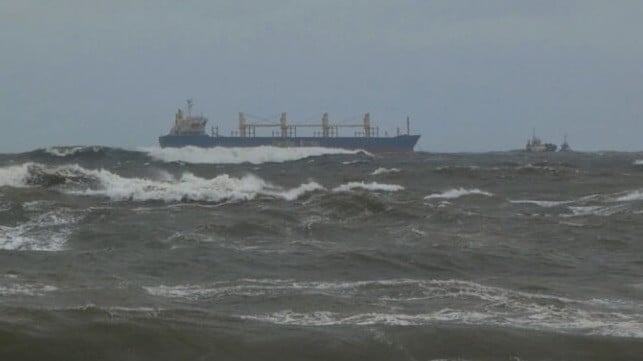Battling “Mountainous” Seas Powerless Bulker is Moved to Shelter

Australian authorities were forced to switch to an alternate salvage plan for a disabled bulker caught in a fierce storm off the southern coast after a towline parted and the crew aboard reported that they were not able to complete repairs to the ship’s engine. After a struggle against high seas and heavy winds, they are now reporting the Pacific Basin bulker Portland Bay has been positioned in a more sheltered area where it should be able to ride out the storm.
Forecasting a temporary break in the bad weather that has plagued the bulker, the Australian Maritime Safety Authority early on July 6 has ordered that the vessel must move to a berth at Botany Bay on Wednesday. "Bad weather preventing the movement of the vessel into harbor has now subsided. The vessel must comply with the direction to move to harbor today as more bad weather is forecast for Thursday," wrote AMSA in issuing its legal direction to the ship's master.
The efforts to secure the bulker began early on July 4 when the vessel reported that it had lost power after an engine failure. Unable to hold its position with its anchors, the vessel was in danger of being washed ashore on some of Australia’s most pristine coastline. Fearing that the vessel would be driven onto the rocks, the authorities first attempted to airlift the crew off the ship, but the winds and high seas made it impossible, so they decided to pull the bulker out to sea.
“The ongoing severe weather conditions makes moving the Portland Bay extremely hazardous so the vessel is being supported in position until the weather eases,” said Captain Philip Holliday, CEO of Port Authority of NSW which is overseeing the efforts. “Based on current weather forecasts, it is expected that the ship will remain offshore until at least Wednesday.”
Three tugs were being used to reposition the vessel and as of Monday evening were making progress traveling at approximately 1.5 knots. The goal was to maintain a position approximately 12 nm offshore while the crew attempted to make repairs. However, the efforts to reposition the vessel stalled overnight as the towline parted.
“With 11-meter swells experienced last night, an operational decision was made to suspend further attempts to tow the ship out to sea,” explained Holliday.
The Premier of New South Wales spoke to reporters on Tuesday saying "I thank very much the crews of those tugs for the heroic work they did overnight.” The Maritime Union of Australia echoed a similar sentiment, saying that crews reported the seas mountainous. The Ports Authority also posted a short video to show the challenging sea conditions.
As people move to shelter during the storms, tugboat crews mobilise their tugboat and head out to sea to help save the ship "Portland Bay" and the 21 crew aboard. MUA members who are crewing those tugs are legendary doing what they do. Good luck with this salvage. #SydneyWeather pic.twitter.com/6iTMnlEVi5
— Paul Garrett (@PaulGarrettAU) July 4, 2022
Port Authority's pilot vessel monitors #PortlandBay today as agencies plan for days ahead.@9NewsAUS @NewsC10 @7NewsSydney @SBSNews @abcnews @DCN_Editor @GuardianAus @AMSA_News pic.twitter.com/snU1duSm3U
— Port Authority of NSW (@portauthnsw) July 5, 2022
They elected to move the vessel to the north into a sheltered area. The 28,000 dwt bulker has been positioned approximately 1.2 nautical miles off Port Botany with one tug remaining attached to the vessel. In addition, the Australian Maritime Safety Authority arranged for Svitzer’s heavy-duty tug Glenrock to travel from its homeport in Newcastle to provide support.
“The third Emergency Tow Vessel, Glenrock has arrived onsite after punching through southerly headwinds and over 10-meter seas during the passage from Newcastle,” said Holliday. “The specialized vessel with additional deep-sea response capability, Glenrock, will be key in the next phase when moving the Portland Bay to safety.”

that matters most
Get the latest maritime news delivered to your inbox daily.
The crew had initially reported that they had spare parts aboard and believed they could complete the repairs. However, as of Monday evening, they reported that it would require additional work. The plan is now to tow the Portland Bay to Port Botany where it will complete repairs.
“Those smaller tugs have done amazing work over the past 24-36 hours ensuring the stricken vessel did not drift into the coastline," said AMSA Executive Director Response Mark Morrow. Explaining that the larger Glenrock has now secured towing cables, he said it is vital that the Portland Bay be moved into safe harbor before the next front of bad weather arrives.
